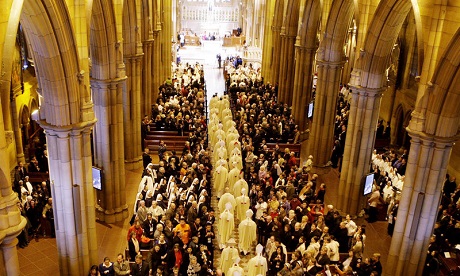A secret report being considered by Australia’s bishops wants unprecedented reform in the church. The reforms aim to make the church more inclusive and break down the structures that contributed to decades of clergy abuse and cover-ups. – Originally reported 25 May 2020
The church could be “dramatically overhauled” to give lay people more power, increase the number of women in leadership roles and force parishes to open up their finances to the public.
Peter Johnstone, who is the convener of the Australian Catholic Coalition for Church Reform, says it is “supremely ironic” that the bishops were now refusing to release a secret report asking them to be more transparent and inclusive of the communities they serve.
The report by the Australian Bishops’ Conference report is said to respond to the findings of the Royal Commission into Institutional Responses to Child Abuse.
The Commission found the hierarchical nature of the church, coupled with its lack of governance, had created “a culture of deferential obedience” in which the protection of paedophile priests was left unchallenged.
In a sign of how sensitive the church is to issues of reform, it is unlikely that the bishops will publicly release the report or reveal how it will respond to the Commission’s 86 recommendations until the end of the year.
Brisbane Archbishop Mark Coleridge, who is the Conference’s current president, acknowledged its proposals would have “far-reaching implications for the Church’s life and mission.
“To do it justice, the bishops will now take advice, consider the report in depth, conduct discussions at a provincial level and otherwise prepare for a full discussion at their November plenary,” he said.
The report followed a 15-month review of church governance, conducted by a seven-member panel led by Justice Neville Owen.
Owen is the former chair of the Truth, Justice and Healing Council.
It is understood the review recommends:
- Bishops cede more control to professional laity, taking a more collegial approach rather than simply being the chief decision maker.
- Catholic dioceses should set up pastoral councils or consultative bodies – ideally with equal numbers of men and women. Their roles would be to advise bishops and parish priests about pastoral matters.
- Church dioceses and agencies be required to meet similar governance standards to other entities. These would have clearer lines of accountability, greater oversight of risks and publicly available financial reports.
At present, religious charities are exempt from reporting to the national regulator. The church has always been guarded about its wealth – even to the point of misleading the royal commission.
However Comensoli has committed to greater financial transparency. Last month he told media “we’re moving towards an annual report of some sort” – but the details were still being developed.
If the report’s recommendations are adopted, the changes would represent a new paradigm for the church, its schools, hospitals and charities and could influence the Church in other parts of the world.
Source
- The Sydney Morning Hrrald
- Image: NPR
